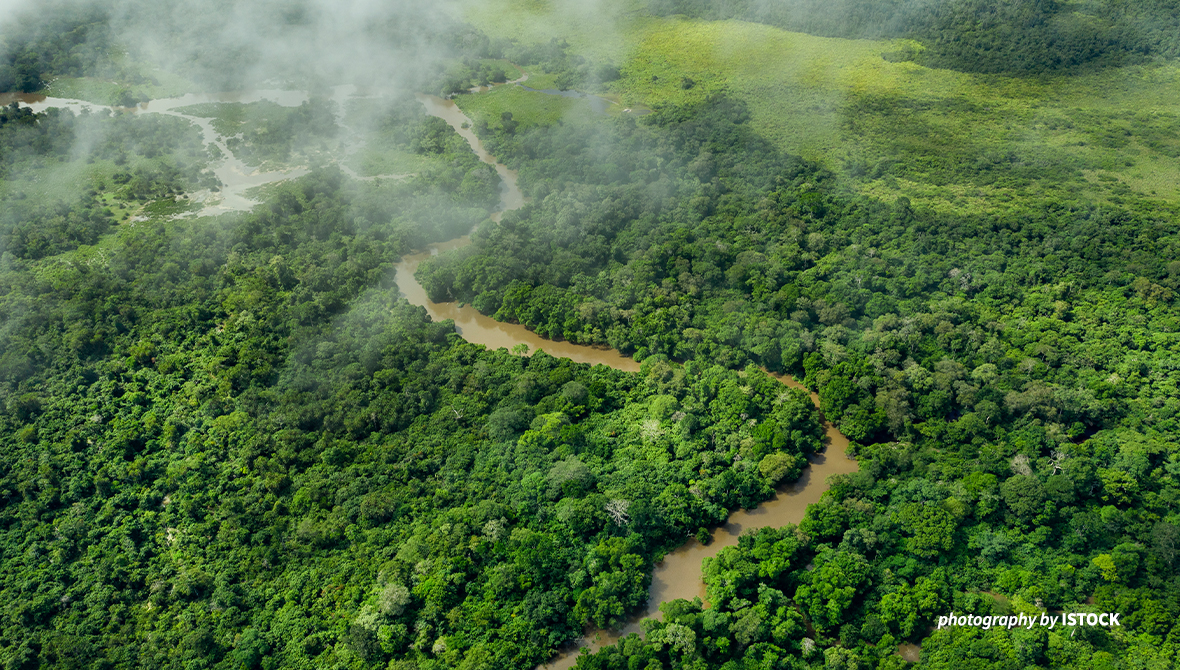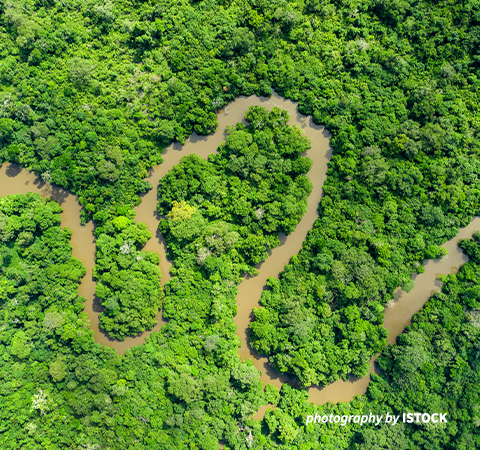COP27: Conserving the Congo Basin rainforest to benefit the globe

At the UNFCCC’s 27th Conference of Parties (COP27), negotiators from around the world are convening to address global action on climate change. Climate threats to Africa are already standing out in a year of extreme weather disasters, including the worst drought in 40 years in the Horn of Africa and severe flooding in West and Central Africa.
Dubbed the “African COP,” COP27 is set to amplify homegrown solutions from the continent, with party negotiators, activists, the private sector, youth, and local communities showing up more aligned than ever before.
But if global climate change efforts are to succeed, conserving Africa’s Congo Basin rainforest—in ways linked to community well-being—must be front and center.
One of Africa’s most critical ecosystems, the 500-million-acre Congo Basin rainforest is the largest carbon sink in the world, absorbing more carbon than the Amazon.
The world needs a healthy and intact Congo Basin rainforest to meet global targets to limit temperature rise. The forests are home to over 400 species of mammals, making up a unique and richly biodiverse ecosystem that serves as a stronghold of resilience against global biodiversity loss. In addition to its global significance, the Congo Basin rainforest is a vital resource for water, food, economic opportunities, and culture to the roughly 130 million people who live in and around it.
However, without proper investment in its conservation and stewardship that delivers for people locally, this key ecosystem will degrade.
As it stands, the list of pressing threats to the ecosystem is long, says Antoine Tabu, AWF’s DRC Country Coordinator. “First, there is over-exploitation of wildlife species and natural resources: overfishing, deforestation, poaching, and artisanal mining in protected areas. On top of that, there is water, soil, and air pollution, and the introduction of invasive exotic species. The presence of transhumant herders in search of grazing pressures habitats as well.”
“Then, there are problems like climate change that can add to and aggravate these other threats,” he adds. “Armed conflict and the occupation of protected areas by armed groups accentuate poaching and make working in the area logistically challenging and sometimes dangerous. All of these pressures compound to significantly threaten the forests of the Congo Basin.”
>>Find out how conservation is linked to people's well-being in the Congo Basin
Delivering results for people and nature in the Congo Basin
To achieve lasting conservation of the Congo Basin rainforest, local buy-in for conservation strategies from people living in and around the rainforest is paramount. Empowering Indigenous peoples and local communities is the only sound method of ensuring conservation over the long haul. The ability to thrive at a local scale underpins human well-being at a global scale.
The African Wildlife Foundation invests in the people of the Congo Basin through a holistic conservation and sustainable development approach, working in two main rainforest landscapes in the DRC. For five years, AWF has worked in large parts of the Bili-Uele landscape, a remote rainforest landscape in the northeastern DRC that stretches over 50,000 square kilometers. AWF invests in community resilience and biodiversity protection in partnership with the Institut Congolais pour la Conservation de la Nature (ICCN) along with other key partners including the European Union, the U.S. Agency for International Development (USAID), and Cooperatione Internationale (COOPI). The program focuses on sustainable agriculture that improves livelihoods, participatory mapping for community land-use planning, improving governance around conservation and development with community groups, and increasing security for communities threatened by militia violence.
AWF trains households in sustainable agriculture techniques that factor in environmental well-being while increasing productivity and improving incomes. Crop rotation is one such technique, where fields are divided strategically into plots for specific crops. The introduction of leguminous plants fixes atmospheric nitrogen and fertilizes the soil. And to make the most of the improved harvests, high-value crops are selected to deliver more income.

AWF and partners are conserving the Congo Basin rainforest and improving livelihoods through sustainable agriculture, land use planning, training and equipping eco-guards, and more.
This agriculture training works in tandem with participatory mapping, a process that raises awareness of the need to implement sound land management practices and empowers communities to make better decisions about their resources. The result is a stronger crop yield that takes up less space.
AWF has sensitized fishermen, hunters, and farmers in the Bili-Uele landscape to the benefits of informed land use, visiting village after village to identify forest guides, train them in the use of GPS, and help them use data collection to produce maps that represent the state of the landscape's forests. This process enables communities to allocate each piece of land to a specific use (including conservation use, sustainable forest harvesting, sustainable agriculture, and more).
As another aspect of the collaboration with the European Union under its ECOFAC6 program, AWF promotes wildlife conservation through the provision of technology and equipment for anti-poaching, training of eco-guards, facilitation of biological inventories, and more. After five years in the area, the program has fostered collaboration between communities and protected area managers, improved food security and livelihoods, and more.
AWF has revitalized the Local Conservation and Development Committees to create a collaborative formal framework that engages protected area managers and the local community together to promote sustainable natural resource management and sustain community development. These local committees offer a chance for grassroots participation in community decisions. In addition to these forums, AWF has built a community radio station, which broadcasts over a 10km coverage. More than 15,000 members of the local community receive information on nature conservation as well as site management and the prevailing security situation in the area.
Through ECOFAC6, AWF has made a significant contribution to improve the security situation in the Central Zone of Bili-Mbomu. As a result of these efforts to improve security in this area, activities are slowly recovering in this remote corner of the DRC, leading to a 65% improvement in food security since 2021 due to the relocation of markets and easier access to food resources.
>Read a deep dive about how the EU’s ECOFAC6 project has improved security and livelihoods in Bili.
Also in the DRC, the Maringa Lopori Wamba (MLW) landscape consists of 74,000 square kilometers across two protected areas: Lomako Faunal Reserve and Iyondji Community Bonobo Reserve. AWF launched our first project in MLW in 2004; now, we work with Arcus Foundation and Village Enterprise to improve the livelihoods of the communities living in and around the reserve.
The program provides them with business management training and micro-grants, as well as accompanying them in capital growth and diversification of income sources. Sustainable agricultural practices are a key part of the program’s income improvement goals.
“AWF worked with communities in the Maringa Lopori Wamba Landscape to promote sustainable agriculture through land-use planning training,” says Tabu, who emphasized the resulting benefits those communities reported. “The communities of Ilima adopted the promoted agricultural practices and recognized the increase of both the agricultural products’ yield and biodiversity in the community.”
In collaboration with Arcus Foundation and USAID through its Central Africa Regional Program for the Environment (CARPE), AWF provides technical and financial support to the ICCN so eco-guards can better manage the landscape. The program provides salaries and patrol rations so their needs are met to work in the field. AWF also holds trainings and supplies high-quality technological equipment that facilitates the collection and analysis of biomonitoring data.
Across all these programs, AWF recognizes communities, especially Indigenous peoples and local communities, as rights holders and partners, implementing training and enforcing a rights-based approach to conservation. Together, we are creating conservation solutions that protect the essential local and global ecosystem services that come from a healthy and intact rainforest.
>Add your name to pledge your support for conserving the Congo Basin
Rachel Emisave contributed to this article.